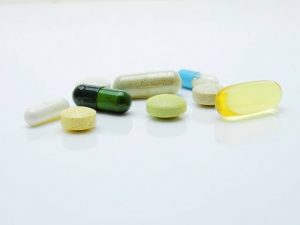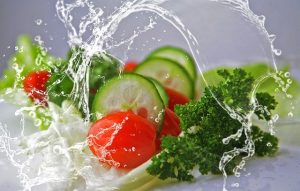 Does your stomach hurt?
Does your stomach hurt?
Scan the health section of your local paper and you’ll see that America has digestion problems.
That includes irritable bowel syndrome, acid reflux and infections of the gastrointestinal system.
What a pleasant thought.
Every problem has a solution right?
And in accordance with the pain of tummy trouble, most Americans simply reach for medicines.
Antispasmodics, proton pump inhibitors, the list goes on.
Unfortunately, it’s a dangerous list.
Recent studies link both over-the-counter and prescription medicines for digestion to a growing set of health risks.
In some cases, digestion medicines are linked to gastrointestinal inflammation, risk of colorectal cancer, and, yes, death.
If that sounds extreme, not to worry.
This is an article on natural health for your digestion problems.
 In most cases, natural supplements can bring lasting relief from IBS, acid reflux and related ailments of the digestive system.
In most cases, natural supplements can bring lasting relief from IBS, acid reflux and related ailments of the digestive system.
And being natural, they come with no reported side effects.
Curious how it all works?
Let’s start off with a look at what ails up to 15% of Americans.
Irritable Bowel SyndromeThis one’s just ugly.
Irritable bowel syndrome is a collection of symptoms that wreak havoc in the lives of those it affects.
Symptoms of IBS include:- abdominal pain- gas- bloating- diarrhea- constipation
Reasons for IBS vary, including age, sex, stress and anxiety.
You’re six times more likely to develop IBS if you’ve had acute infection of the GI tract.
Several studies suggest that up to 60% of IBS patients have a psychological disorder – often stress or anxiety.
And curiously, the average IBS patient is a woman, between 30 and 60.
On a related note, IBS is more common in countries with an emphasis on spicy foods in their diet.
Almost half of Mexicans report frequent symptoms of IBS.
Over 40% of Brazilians and 35% of Pakistanis are affected by this problematic disorder.
IBS is Making the Rounds Because…Brace yourself for this one – America is getting heavy.
 With estimates that up to 70% of American men are either over-weight or obese, and similar numbers for women, and the popularity of decidedly digestion unfriendly trigger foods, including fatty and fried fare, alcohol, artificial sweeteners and chocolate, millions of American stomachs just won’t sit.
With estimates that up to 70% of American men are either over-weight or obese, and similar numbers for women, and the popularity of decidedly digestion unfriendly trigger foods, including fatty and fried fare, alcohol, artificial sweeteners and chocolate, millions of American stomachs just won’t sit.
The situation is made worse by new studies that link IBS medicines, including antispasmodics and antidiarrheals, to dry mouth and blurry vision.
Lotronex, a prescription IBS medicine, was pulled from the market in 2001 after the FDA linked four deaths to popular treatment.
And although it’s been made available yet again, it remains a controversial and risky way to manage IBS.
Why You Shouldn’t Ignore IBS – Let’s be honest, it’s pretty hard to ignore the pain and discomfort of irritable bowel syndrome.
Having said that, if it’s a common visitor in your routine, be sure to speak with your doctor about IBS, as it may be a harbinger of food allergies or infections of the GI system.
Left untreated, studies suggest the latter may lead to cancerous polyps and colorectal cancer.
Common Treatments Include – Both over-the-counter and prescription medicines. In the OTC camp are antidiarrheals, including Imodium and Maalox.
While these can relieve diarrhea, such treatments can make other IBS symptoms worse.
Should you go this route, take the lowest dose possible and for short-term use only.
Curiously, the average IBS patient is a woman, between 30 and 60.
Prescription medicines for IBS include antispasmodics, such as Levbid and Bentyl, which relax the smooth muscles of the gut, and Lotronex.
We’ve already seen that Lotronex is among the most effective prescription IBS medicines, but it can’t shake the side effects, hospital visits and, you know, that whole death thing.
If you pursue prescription IBS medicine, keep an open communication with your physician.
View it as a short-term fix to a long-term strategy to minimize IBS and the effects it has in your life.
So…what’s a long-term treatment for IBS?
Natural Health For IBS Looks Like…An IBS journal, of your triggers and symptoms, avoidance of your trigger foods and an emphasis on fiber.
For constipation, men should consume 38 grams of fiber each day and 25 grams for the ladies.
Is diarrhea a problem?
Focus on soluble fibers, including oat bran, barley and apples, which leave the body slowly and allow contents to bulk up before passage.
A new study confirms the mind-gut connection and that mindful meditation can reduce IBS symptoms by almost 40%.
Also consider stress management techniques and relaxation.
A new study confirms the mind-gut connection and that mindful meditation can reduce IBS symptoms by almost 40%.
And if IBS is a continuous struggle, as it is with millions of Americans, try the above techniques with a natural IBS treatment system, which makes use of natural laxatives, including psyllium husk.
Add probiotics and a daily fiber and nutrient supplement with chia and you’re in good shape to keep IBS in check.
Suggestions? Try Digestive Science IBS Relief System.
Acid RefluxNot familiar with this one?
Acid reflux is a condition in which stomach acid escapes through the lower esophageal sphincter (LES) valve and enters the esophagus.
Symptoms include:- heartburn- chronic sore throat- ongoing hiccups- nausea- regurgitation
 Risk factors for acid reflux include obesity, pregnancy, eating large meals and lying down after a meal.
Risk factors for acid reflux include obesity, pregnancy, eating large meals and lying down after a meal.
While it’s common to experience these symptoms on occasion, if they occur more than twice a week, it’s worth speaking with your doctor, as you most likely have acid reflux disease.
More than just an inconvenience, acid reflux can be painful.
Chronic sore throat?
The painful, burning sensation of heartburn?
All symptoms of stomach acid that just won’t stay in the stomach.
Reflux occurs for several reasons, among which a lack of digestive enzymes and/or a hiatal hernia, in which the stomach and LES move higher than the esophagus, are common causes.
Acid Reflux is Making the Rounds Because…The medicines that Americans take to ease the pain of acid reflux are linked to a disturbing array of side effects.
Proton pump inhibitors, including Prilosex and Aciphex, inhibit production of stomach acid.
In such an environment, dangerous bacteria, such as C.diff can spread, causing diarrhea and gastrointestinal infections.
PPIs are the most powerful of the antacid stomach medications and the third highest-selling class of drugs in the United States, with over 113 million prescriptions written by American doctors in 2009.
Why You Shouldn’t Ignore Acid Reflux – Take a deep breath.
This next part is unpleasant but if they apply to you, high-tail your way to a physician.
Bloody vomit, black stool or otherwise distorted excrement are all symptoms of acid reflux disease which can predicate esophagitis, or narrowing of the esophagus, which can make it difficult to swallow food or create the sensation that something’s stuck in your throat.
Acid reflux can also lead to ulcers, throat and voice problem, tooth decay and esophageal cancer.
Proton pump inhibitors may increase risk of GI infections, pneumonia, fractures in women and even deadly cases of diarrhea.
Common Treatments Include: Proton pump inhibitors are prescription-strength antacids and generally available with a nod from your doctor.
Less potent, over-the-counter antacids include Maalox, Rolaids and Tums.
In addition, H2 receptor antagonist (H2RA) drugs are less powerful OTC acid suppressants and commonly used to treat reflux.
Examples include Axid. Pepcid and Zantac.
Of these treatments, PPIs are by far the most popular reflux medicines, and present the most health risks.
PPIs reduce stomach acid, which reduces the pain of reflux, yet also allows growth of dangerous strains of bacteria that would otherwise be eliminated.
Proton pump inhibitors may increase risk of GI infections, pneumonia, fractures in women and even deadly cases of diarrhea.
Natural Health For Acid Reflux Looks Like…Acid control for pain relief, enzyme renewal for balance and long-term digestion support with fiber and digestion-pleasing nutrients.
Despite the (temporary) relief they offer, antacids, and PPIs in particular are simply not designed for long-term use and may alter the delicate constitution of your digestion system.
And with the risks they present, frankly, you’re better off with a natural treatment for acid reflux.
Choose a natural system to treat reflux and you may address the cause of your reflux rather than masking symptoms with temporary and potentially dangerous acid suppressants.
As we’ve reviewed, lack of digestive enzymes is a common cause of reflux symptoms.
Choose a natural system to treat reflux and you may address the cause of your reflux rather than masking symptoms with temporary and potentially dangerous acid suppressants.
Don’t get me wrong – it’s important to reduce the pain of excess stomach acid.
But you’re better off doing it naturally.
Put that PPI down.
Try a natural treatment with slippery elm and aloe vera instead.
You’re also looking for an enzyme renewal supplement and an ongoing digestion supplement, preferably one that’s formulated with psyllium husk and chia.
Of these prerequisites for healthy, natural and lasting relief from reflux, Digestive Science Reflux Elimination System should be at the top of your list.
Inflammation of the Gastrointestinal SystemA lesser-known ailment of the digestive system.
Yet it’s a common result of the North American lifestyle and the symptoms are, well:
– gas- constipation- diarrhea- fatigue and irritability- poor skin condition
Notably, several studies suggest that inflammation of the GI tract may lead to colorectal cancer, which includes cancers of the colon, rectum or vermiform appendix.
Take your pick, each one is a lousy way to go.
And colorectal cancer is the third most commonly diagnosed cancer in the world, with roughly 610,000 deaths in 2008.
Risk factors for inflammation of your gastrointestinal system?
They include stress, poor diet, food allergies, drugs, antibiotics and fatty acid deficiencies.
Some of these may look familiar – as in, the lifestyles led by just about every American and his kid brother.
Colorectal cancer is most common in developed countries like the United Kingdom and, yup, the good old U S of A.
Gastrointestinal Inflammation is Making the Rounds Because…Recent studies suggest that men develop precancerous polyps earlier than women.
Another study suggests that high levels of fusobacterium may cause the disease.
In either scenario, the world is aging, and age being another risk factor in colorectal cancer, in addition to obesity, and you get the picture.
Why You Shouldn’t Ignore it – See above.
Said inflammation may lead to colorectal cancer.
And arthritis, bone loss, problems with the eye, liver and kidney problems.
This is above the symptoms of bad digestion and risk of ulcers linked to inflammatory bowel disease.
Common Treatments Include – Prevention is key here, as is a healthy diet, with plenty of fruits and vegetables.
 Once diagnosed, your doctor may (temporarily) recommend a diet low in fiber, to minimize fiber and undigested material that pass through your colon.
Once diagnosed, your doctor may (temporarily) recommend a diet low in fiber, to minimize fiber and undigested material that pass through your colon.
Medical treatment for GI inflammation include anti-inflammatory drugs, of which aminosalicylates are commonly prescribed.
The doctor may also recommend anti-diarrheals and antispasmodics to relieve symptoms.
And yes, even doctors reach for acid suppressants, including those beloved PPIs, to get through the darkness of GI inflammation.
Perhaps the most universal yardstick to gauge colon health may be the colonoscopy, in which a microscopic camera is (tell yourself it’s for your health and well-being) inserted up the rectum to search for abnormal growths, or adenomas.
Unpleasant?
Yes…but the colonoscopy is perhaps the most effective way to guard against colorectal cancer and is recommended for adults over 50.
Natural Health For Gastrointestinal Inflammation Looks Like…You know those green, leafy vegetables you should be eating?
Get them on your plate – fast.
Follow Popeye’s lead and load up on cartenoid-rich spinach.
Ditto vitamin C-heavy broccoli.
The basics count folks.
A well-balanced diet with plenty of fruits and vegetables can keep your insides much happier that processed, fatty foods.
And what’s this about the whole colon cleanse routine?
Well, most of them are a combination of laxatives and fad diets designed to purge your body of the toxins that can accumulate in your colon and enter the blood stream.
In the process, they can alter the balance of microbes in your gut, further aggravate your colon and stress your body in ways that they shouldn’t. Avoid.
And yet, the benefits of colon cleansing are well-documented.
If you’re a healthy individual, not pregnant or nursing, it might be worth your time.
Should you travel this road, consider the following:
First, choose a natural cleanse, and a slow cleanse at that.
Look for a process that cleanses over several days rather than an all-at-once blitz on your bowels.
Preferably a cleanse of a week or longer.
Second, probiotics are a good thing.
And many colon cleansers upset the delicate balance of beneficial bacteria versus the bad guys.
Balance is key here.
You could do worse than to choose a colon cleanse system with probiotic support.
Finally, remember that healthy digestion is a journey.
Don’t abandon your gastrointestinal system once the cleanse is over.
Look for a colon cleanse system with ongoing supplementation for health and comfort, to keep your tummy firing on all cylinders, yet with the smooth, quiet and comfortable ride of a six-figure German luxury sedan.
This narrows your choices down considerably.
However, you can’t go wrong with the Digestive Science line of natural digestion products.
If you’re interested in the benefits of colon cleansing, check out their Intensive Colon Cleanse.




